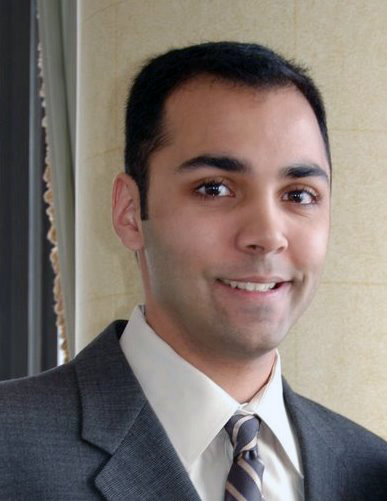July 29, 2010
Drs. Teresa Evering and Manish Ponda, both recent graduates of Rockefeller University Center for Clinical and Transtional Science Master’s degree in Clinical and Translational Science, have been selected to receive Mentored Clinical Scientist Research Career Development Awards (K08). The K08 award provides support and “protected time” to individuals with a clinical doctoral degree for an intensive, supervised research career development experience in the fields of biomedical and behavioral research, including translational research. The award is intended to support an intensive, supervised research career development experience in biomedical research by providing 5 years of salary support as well as funds for supplies.
Dr. Evering was awarded a K08 for her project titled, ‘The Role of HIV-1 Evolution in Neuroadaptation.’ This five-year project is funded by the National Institute of Mental Health, and will officially start on July 1, 2010. Dr. Evering’s mentors are Dr. David Ho and Dr. Martin Markowitz at the Aaron Diamond AIDS Research Center.
Dr. Evering’s work focuses primarily on the central nervous system (CNS), which is an important sanctuary site for the human immunodeficiency virus-1 (HIV-1). “The importance of the central nervous system as a sanctuary site for the human immunodeficiency virus-1 (HIV-1) is well documented in the literature. Penetration of the CNS by HIV-1 occurs early in infection, and can result in a wide range of pathological and clinical manifestations – all of which can contribute significantly to morbidity and mortality.” The widespread use of highly active antiretroviral therapy (HAART) has led to a clear reduction in the incidence of HIV-associated dementia (HAD), one of the most severe manifestations of HIV-1 CNS infection. Despite this decrease, the prevalence of minor HIV-1 associated cognitive impairment appears to be on the rise. Although more subtle, these impairments can be disabling and have been suggested to be independently associated with an increased risk for mortality in those with HIV-1. It is therefore important to develop an improved understanding of the adaptive behavior of HIV-1 in the CNS. When asked about the overall aim of the study Dr. Evering stated, “The overriding goal of my proposed research is to use HIV-1 variants sequenced from cerebrospinal fluid (CSF), to elucidate HIV-1 CNS evolutionary pathways and explore genetic determinants of neurotropism, neuroinvasiveness and neurovirulence through an in-depth, integrated, phylogenetic and functional approach. Understanding adaptive measures undertaken by HIV-1 to persist in viral reservoirs and sanctuary sites are of paramount importance in defining strategies to improve viral suppression and promote the development of targeted therapies against HIV-1.”
Dr. Manish Ponda was selected to receive a K08 award from the National Institute of Diabetes and Digestive and Kidney Diseases (NIDDK). In collaboration with investigators at NYU, Dr. Ponda utilized an animal model to examine how kidney disease may affect the regression of atherosclerosis. “Conventional therapy directed at atherosclerosis is ineffective in individuals that are already on dialysis. There is a great need for a new therapy to treat these individuals.” So far they have made the novel finding that kidney disease inhibits the regression of atherosclerosis. His current effort is focused on defining the molecular mechanisms behind the phenomenon. This work formed the basis of Dr. Ponda’s K08 proposal.
“The primary mentor for my award is Dr. Jan L. Breslow, who has also been my mentor for the past 3 years during my time as a Clinical Scholar. During the K08 award period starting in July, I will continue working in Dr. Breslow’s lab researching the role of kidney disease in atherosclerosis. The majority of patients with kidney disease die from accelerated cardiovascular disease. It is still unclear, though, precisely how kidney disease contributes to this excess risk.”
The importance of this research is magnified by the statistics about heart disease in patients with kidney failure. “There are a half million people in the United States who are on dialysis and over 10 million with significant kidney disease who are not on dialysis. The majority of these patients will die of cardiovascular disease at rates 10-20 times higher than the general population.”
When asked, Dr. Ponda stated that he looks forward to the opportunity to continue his research at the Rockefeller University Center for Clinical and Translational Science. “The unique structure and facilities of the Rockefeller CTSA, such as the Rockefeller University Hospital and the Clinical Research Coordinators Office, makes it possible to move between bench and bedside. My five-year plan is to focus on the molecular mechanisms of atherosclerosis in the context of kidney disease, but also to continue to conduct clinical an translational science based on our findings to this point.”
2010 CCTS Clinical Scholars Graduates Teresa Evering and Manish Ponda Awarded K08 Grants
By Jennifer Spada  |
 |
| Teresa Evering, M.D. |
Manish Ponda, M.D. |
Dr. Evering was awarded a K08 for her project titled, ‘The Role of HIV-1 Evolution in Neuroadaptation.’ This five-year project is funded by the National Institute of Mental Health, and will officially start on July 1, 2010. Dr. Evering’s mentors are Dr. David Ho and Dr. Martin Markowitz at the Aaron Diamond AIDS Research Center.
Dr. Evering’s work focuses primarily on the central nervous system (CNS), which is an important sanctuary site for the human immunodeficiency virus-1 (HIV-1). “The importance of the central nervous system as a sanctuary site for the human immunodeficiency virus-1 (HIV-1) is well documented in the literature. Penetration of the CNS by HIV-1 occurs early in infection, and can result in a wide range of pathological and clinical manifestations – all of which can contribute significantly to morbidity and mortality.” The widespread use of highly active antiretroviral therapy (HAART) has led to a clear reduction in the incidence of HIV-associated dementia (HAD), one of the most severe manifestations of HIV-1 CNS infection. Despite this decrease, the prevalence of minor HIV-1 associated cognitive impairment appears to be on the rise. Although more subtle, these impairments can be disabling and have been suggested to be independently associated with an increased risk for mortality in those with HIV-1. It is therefore important to develop an improved understanding of the adaptive behavior of HIV-1 in the CNS. When asked about the overall aim of the study Dr. Evering stated, “The overriding goal of my proposed research is to use HIV-1 variants sequenced from cerebrospinal fluid (CSF), to elucidate HIV-1 CNS evolutionary pathways and explore genetic determinants of neurotropism, neuroinvasiveness and neurovirulence through an in-depth, integrated, phylogenetic and functional approach. Understanding adaptive measures undertaken by HIV-1 to persist in viral reservoirs and sanctuary sites are of paramount importance in defining strategies to improve viral suppression and promote the development of targeted therapies against HIV-1.”
Dr. Manish Ponda was selected to receive a K08 award from the National Institute of Diabetes and Digestive and Kidney Diseases (NIDDK). In collaboration with investigators at NYU, Dr. Ponda utilized an animal model to examine how kidney disease may affect the regression of atherosclerosis. “Conventional therapy directed at atherosclerosis is ineffective in individuals that are already on dialysis. There is a great need for a new therapy to treat these individuals.” So far they have made the novel finding that kidney disease inhibits the regression of atherosclerosis. His current effort is focused on defining the molecular mechanisms behind the phenomenon. This work formed the basis of Dr. Ponda’s K08 proposal.
“The primary mentor for my award is Dr. Jan L. Breslow, who has also been my mentor for the past 3 years during my time as a Clinical Scholar. During the K08 award period starting in July, I will continue working in Dr. Breslow’s lab researching the role of kidney disease in atherosclerosis. The majority of patients with kidney disease die from accelerated cardiovascular disease. It is still unclear, though, precisely how kidney disease contributes to this excess risk.”
The importance of this research is magnified by the statistics about heart disease in patients with kidney failure. “There are a half million people in the United States who are on dialysis and over 10 million with significant kidney disease who are not on dialysis. The majority of these patients will die of cardiovascular disease at rates 10-20 times higher than the general population.”
When asked, Dr. Ponda stated that he looks forward to the opportunity to continue his research at the Rockefeller University Center for Clinical and Translational Science. “The unique structure and facilities of the Rockefeller CTSA, such as the Rockefeller University Hospital and the Clinical Research Coordinators Office, makes it possible to move between bench and bedside. My five-year plan is to focus on the molecular mechanisms of atherosclerosis in the context of kidney disease, but also to continue to conduct clinical an translational science based on our findings to this point.”

